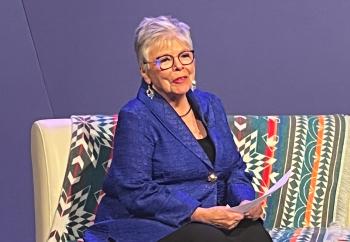Image Caption
Local Journalism Initiative Reporter
Windspeaker.com
Whenever Roberta Jamieson speaks, people pay close attention to her insightful words. Such was the case on April 29, when Jamieson, a member of Six Nations of the Grand River in Ontario, was a panelist during a session at the First Nations Major Projects Coalition (FNMPC) conference in Toronto.
Jamieson, the first Indigenous woman in Canada to earn a law degree, spoke on a panel titled Stronger Boards, Smarter Business: The Case for Indigenous Representation in Corporate Leadership.
Jamieson, a leading Indigenous activist who was also the first woman appointed as the Ontario Ombudsman, has served on numerous boards.
When it comes to Indigenous representation on boards in Canada, Jamieson said expectations are often ill-informed and inappropriate.
“And those are kind words,” she said.
Jamieson said she instead would utilize words some might deem offensive.
“We’re not mascots,” said Jamieson, who received the Order of Canada in 1994.
“We’re not tokens. We are not there to be performative in the window for corporations that want to look good that they’ve recruited one of our people."
She also said Indigenous people are not the all-knowing.
“I’m a Mohawk. What do I know about dealing with the Haisla or the Mi’kmaq or the Cree? What I know is that you have to deal with them. But I’m not the all-knowing. I’m not the Wikipedia,” she said.
Jamieson said corporate boards who do include an Indigenous member should not expect to get an individual who will an expert on all things Indigenous.
“But what they’ll get is a unique rich perspective, often infused with the history of relations between Indigenous peoples in Canada over time,” she said. “And they also get a source of knowledge where they can check assumptions in a low-risk environment.”
Additionally, Jamieson said boards will get someone who will encourage learning as a group about what is happening in the world about Indigenous relations. And they will get someone who will help them understand why Indigenous people are not stakeholders.
“We are rightsholders, which has been constitutionally recognized and court sanctioned,” she said. “There are obligations here to be honored.”
Jamieson said prospective Indigenous board members have plenty to be mindful of when approached for a position.
“Sometimes we think, ‘oh my god, we’re offered a board seat, we must seize it.’ We have that opportunity, we must take it on,” she said. “I say be careful. Examine the fit. Examine why you’re being recruited. Is it a culture that will nurture and let you be who you are?”
Jamieson also said Indigenous people on boards need to understand their positions.
“We are not there on boards as political leaders,” she said. “That’s not the job. I’ve had people come to me and say ‘I’m so glad you’re on that board. And now you can do this and this and make sure that and that.’ And I’ll say ‘Wait a minute. I’m not there as an advocate. I have fiduciary responsibilities. I have responsibilities to the shareholders. But let me tell you this. I see issues through an Indigenous lens.’
“I take a long view, as well as a quarterly view. And in shaping and governing and overseeing things from a board seat, that lens is in full form.”
Jamieson believes Indigenous people have plenty to offer corporate boards in the country.
These include having sound beliefs on environmental stewardship dealing with climate change, as well as long-term vision. Indigenous people are taught to think seven generations into the future.
“The expectations on the part of those seeking board representation and on the part of those being recruited have to align so that you can be successful and the company will be successful on the bottom line as a result,” Jamieson said.
Other panelists who joined Jamieson for the session were Oswaldo Gromada Meza, the CEO of the Latino Corporate Directors Association, and Shawn Cooper, the managing director for Russell Reynolds Associates’ Board and CEO Advisory Partners.
The panel was moderated by Dr. Marie Delorme, the CEO of The Imagination Group of Companies.
The two-day FNMPC conference was held at the Sheraton Centre Toronto Hotel and attracted about 1,800 delegates.
The FNMPC is a national non-profit organization with a mandate to provide First Nations members with access to tools, advice and knowledge to make business decisions about First Nations involvement and participation in major natural resource and infrastructure projects.
Local Journalism Initiative Reporters are supported by a financial contribution made by the Government of Canada.

